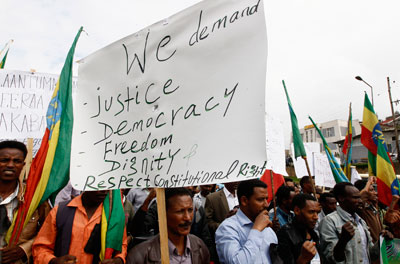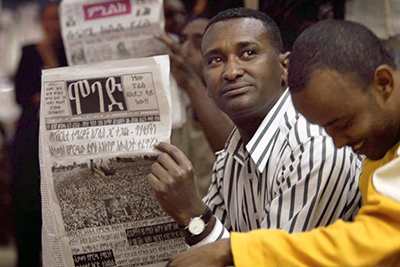One year after arrest Zone 9 bloggers remain imprisoned as trial drags on
It will be one year this weekend since six bloggers were arrested in Addis Ababa, just days after the group announced on Facebook that their Zone 9 blog would resume publishing after seven months of inactivity. As the anniversary of the arrests approaches on Saturday, Soleyana S. Gebremichale, one of the Zone 9 founders who…

Mission Journal: Ethiopian journalists must choose between being locked up or locked out
A sharp increase in the number of Ethiopian journalists fleeing into exile has been recorded by the Committee to Protect Journalists in the past 12 months. More than 30–twice the number of exiles CPJ documented in 2012 and 2013 combined–were forced to leave after the government began a campaign of arrests. In October, Nicole Schilit…

New charges against Ethiopian publications further diminish critical voices
Five independent magazines and a weekly newspaper have been charged by Ethiopia’s Justice Ministry, a move that may add to the long lists of shuttered publications and Ethiopian journalists in exile. In a press release issued August 4, the ministry accused the journals of publishing false information, inciting violence, and undermining public confidence in the…

First US-Africa summit short on press freedom, other human rights
Top African and U.S. leaders are meeting next week in Washington in a first-of-its-kind summit focused on African development. But critics argue the summit is flawed in design, overlooking human rights such as freedom of expression and barring civil society actors from bilateral discussions.
No press freedom without Internet freedom
Four years ago, when CPJ launched its Internet Advocacy program, we were met with lots of encouragement, but also some skepticism. “Why do you need a program to defend the Internet?” one supporter asked. “You don’t have a special program to defend television, or radio, or newspapers.” But the Internet is different. Increasingly, when it…
CPJ calls on Ethiopian government to release imprisoned journalists
CPJ is among a group of more than 40 regional and international press freedom and civil society organizations that have signed a joint letter to Ethiopian Prime Minister Hailemariam Desalegn expressing concern over the recent imprisonment of Ethiopian journalists under the country’s far-reaching 2009 anti-terrorism law.

Twenty Ethiopia state journalists dismissed, in hiding
“If they cannot indoctrinate you into their thinking, they fire you,” said one former staff member of the state-run Oromia Radio and Television Organization (ORTO), who was dismissed from work last month after six years of service. “Now we are in hiding since we fear they will find excuses to arrest us soon,” the journalist,…
Zone 9 blogger urges world to call for freedom in Ethiopia
In April, the Ethiopian government imprisoned nine journalists, including six bloggers from Zone 9, in one of the worst crackdowns against free expression in the country. Ethiopia is the second worst jailer of journalists in Africa, trailing only Eritrea, according to CPJ research.

Ethiopia’s independent publishers may face another hurdle
In what appears to be one of a collection of measures to silence the press ahead of 2015 elections, Ethiopian authorities in the Communications Ministry are preparing a new system to control the distribution of print media. Privately owned newspapers and magazines, possibly the only remaining independent news sources in the country, would face more…

Ethiopian journalist on prison odyssey needs medical care
“When I grow up will I go to jail like my dad?” This was the shattering question that the five-year-old son of imprisoned Ethiopian journalist Woubshet Taye asked his mother after a recent prison visit. Woubshet’s son, named Fiteh (meaning “justice”), has accompanied his mother on a wayward tour of various prisons since his father…